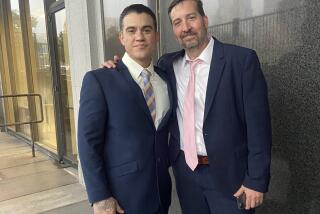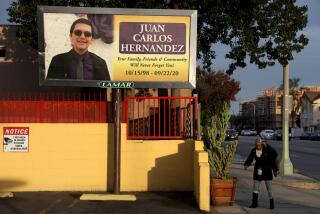A Riverside County judge says a detox center didn’t murder its client
A murder charge against a drug and alcohol rehab corporation and its employees in the death of a client was thrown out Friday by a Riverside County judge, sharply limiting a criminal case that had sent a jolt through California’s large drug and alcohol rehabilitation industry.
The judge ruled that there was insufficient evidence for murder, but decided the state attorney general’s office could continue with dependent adult abuse charges against A Better Tomorrow and four of its employees. The facility’s lawyers said the case marked the first time in California history that a corporation had been accused of murder.
“We think the court reached the right conclusion with regards to the murder charges in this case,” said attorney Brian Hennigan, who represents one of the accused employees. “We’re gratified we got a fair hearing and a ruling on the merits.”
Superior Court Judge Elaine M. Kiefer also dismissed dependent adult abuse charges against another employee, Tami Scarcella.
Rachele Huennekens, a spokeswoman for the attorney general’s office, said the company and its employees are responsible for “serious abuse that led to” Gary Benefield’s death in 2010 and that prosecutors would continue to pursue the remaining charges.
“Patients and family members rely on the promises of caregivers and trust they will provide the best possible care to their loved ones. A Better Tomorrow broke its promises, violated that trust and caused the untimely death of Gary Benefield, a vulnerable person seeking help to overcome addiction,” Huennekens said.
A Riverside County grand jury indicted the company and its employees last year.
Benefield came to California from his home in Arizona seeking treatment for alcohol addiction. He was found dead the morning after arriving at A Better Tomorrow’s Murrieta detox facility. It was his 53rd birthday.
The longtime smoker suffered from a host of medical troubles. He had been hospitalized with a bad bout of pneumonia and for years had relied on an oxygen tank to breathe.
Prosecutors argued that the company, in its drive for profit, accepted Benefield when it was not prepared to care for him and killed him by giving him medications that made it difficult for him to breathe and failing to refill his oxygen.
Benefield was given Serax, an anti-anxiety drug often used to treat alcohol withdrawal, to calm him down, according to court records. Prosecution experts told the grand jury that Serax would have inhibited Benefield’s breathing, compounding his lack of supplemental oxygen and ultimately contributing to his death.
Defense attorneys noted that the Riverside County coroner who handled Benefield’s death determined that the Arizona man had died of natural causes, but he was never called as a witness before the grand jury. The coroner later said in a court declaration that he did not believe the lack of oxygen or drugs given to Benefield at the facility contributed to his death.
The defense accused the attorney general’s office of misconduct and said Deputy Atty. Gen. Joel Samuels’ decision not to call the coroner had unduly swayed the grand jury against their clients.
In her ruling, Kiefer dismissed that argument, saying that Samuels acted properly when he presented details of the coroner’s findings to the grand jury, even though he did not call him as a witness.
In tossing out the murder charge, however, Kiefer said the prosecutor failed to establish that the defendants acted in ways they knew could endanger Benefield’s life, as required under state law to support a murder charge.
The prosecution’s case relied heavily on the fact that medications were given to Benefield without a prescription, she said. But the prosecutor didn’t show that the employees thought those medications might kill Benefield.
“There is no evidence that any of the defendants knew that their acts of giving the medications to Benefield were dangerous to the extent that they risked killing him,” she wrote.
The prosecutor, however, did present enough evidence for the grand jury to find that the defendants “acted negligently” when they gave out unprescribed medication, she said in upholding the abuse charges.
Benjamin Gluck, an attorney who represents company founder Jerrod Menz, who is among those indicted, said he was “very pleased” with the judge’s ruling.
“We appreciate the court’s carefully reasoned decision on some very complex and novel issues,” he said.
The other defendants are Kris McCausland, the house manager at the Murrieta facility; company director James Fent; and employee Meg Dean.
Experts said the attorney general’s office may have pursued the murder charge as a warning to California’s massive treatment industry of more than 1,500 facilities that draw clients from around the nation.
A state Senate oversight committee in 2012 issued a report outlining Benefield’s death and others, saying the state was failing to properly police treatment facilities “with deadly results.”
Benefield was the fourth person to die at A Better Tomorrow in a little over two years.
In the months after Benefield’s death, the state Department of Alcohol and Drug Programs moved to revoke the license for the house where Benefield was admitted. By then, the company had already closed it, although the firm continued operating other facilities.
After Friday’s ruling, Huennekens, the state attorney general’s spokeswoman, said the office would “continue to hold for-profit care facilities accountable and enforce our state laws.”
Twitter: @PalomaEsquivel
ALSO:
Student stabbed at Boyle Heights elementary school
Dog drowning in Marina del Rey has authorities looking for ‘puppy killer’
Homeless man gets $100,000 check for spotting O.C. jail escapees
More to Read
Start your day right
Sign up for Essential California for news, features and recommendations from the L.A. Times and beyond in your inbox six days a week.
You may occasionally receive promotional content from the Los Angeles Times.







